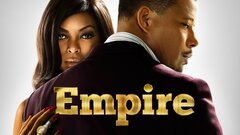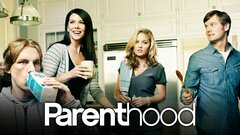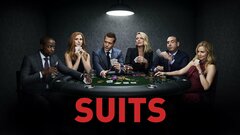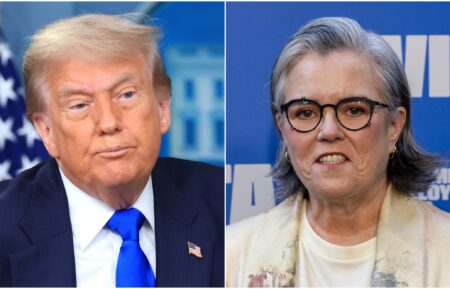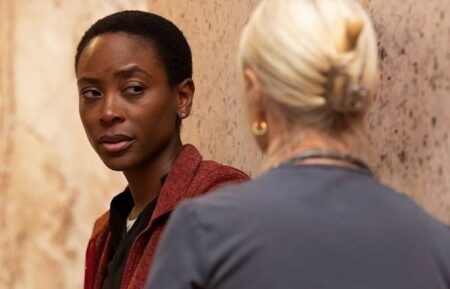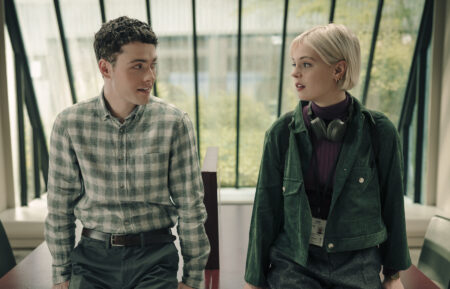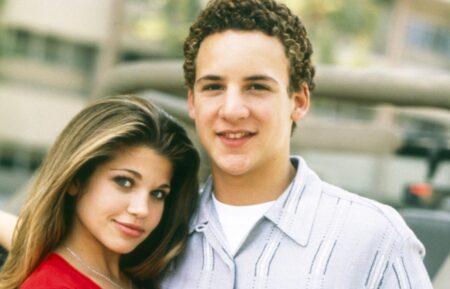Ask Matt: Empire, Suits, Galavant, the Parenthood Finale, and More

For those new to the “Ask Matt” column, this is a weekly Q&A with TV critic (also known to some TV fans as their “TV therapist”) Matt Roush, who’ll address whatever you love, loathe, are confused or frustrated or thrilled by in today’s vast TV landscape. One caution: This is a spoiler-free zone. Don’t ask me what’s going to happen on a show. I prefer to find out along with everyone else. Please send your questions and comments to [email protected].
Question: I’m loving Empire, despite my total ignorance of all things hip-hop, and it looks like the ratings are good. Any idea why some of the headlines I’ve read keep expressing surprise at the success? A good show full of sociopaths behaving badly in entertaining ways, great cast and music. What’s not to love? — Anna
Matt Roush: It has nothing to do with the show, it’s more like there’s an element of shock and surprise whenever a network, especially one as in-the-doldrums as Fox, lands a genuine new hit, which is a far less common occurrence than it used to be. Empire was seen as something of a risk because of its unproven subject matter and its highly serialized storyline, which if it didn’t take off instantly could have been especially problematic going forward. Happily, not only did Empire open strong, but the numbers have held up and generally improved week to week. It is, by any standards, a hit—and a hoot. If this is a surprise to anyone, it’s an awfully pleasant one. But read on to see the climate of skepticism into which Empire was introduced.
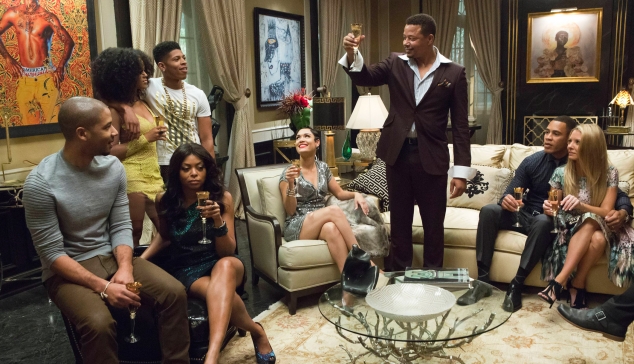
Question: Will Empire be another one-season series like Fox’s The Mob Doctor and Gang Related? And why did you ignore those other series in your weekly radio segment with Jimmy Cefalo at WIOD Miami? — Marc S.
Matt Roush: [Note: My weekly Friday chat with Jimmy Cefalo is one of a number of regular radio interviews I do across the country.] The answer is, happily, no. Empire has already been picked up for a second season. So, for that matter, has Fox’s other freshman success story, Gotham. But the fact that you would have to ask is an indication of how skittish viewers are these days, given the quick fades of so many network series, including the instant dud Mob Doctor and last season’s more honorable midseason failure Gang Related. The reason I didn’t reference them in my conversation with Jimmy was 1) time; and 2) relevance. Both shows were long dead, and the reason I brought up Empire in the first place was to remark on it being such an unexpected breakout hit, which neither of the other two ever came close to being.
Question: I know you’ve talked about your admiration for both Arrow and The Flash, but I think one of the things I’ve really liked ever since they introduced Barry Allen on Arrow last season is how they’ve integrated the shows in ways that make them feel like they really exist in the same universe, despite The Flash being a “lighter” show than Arrow. It seems like a lot of spin-offs exist in alternate universes from each other, universes that only intersect occasionally, and often during “sweeps months.” While Arrow/Flash had the obligatory cross-over episodes (which I think worked pretty well, especially the Flash half), the writers of each show have peppered in occasional references to the other show that make you feel like they’re more “real”—as real as shows dealing with “meta-humans” and a rich vigilante can feel—without overdoing it. I think this has been a smart move on their part, as it gives viewers a reason to watch both shows. Do you think other “franchise” shows (NCIS, etc.) would work better if they had similar integration, or are the writers better off being able to focus on their show without having to worry about what’s going on with the sister show(s)? Also, I know it’s probably too soon to know for sure, but do you think that the upcoming Supergirl series (also created by Arrow/The Flash‘s Greg Berlanti) will be able to have the same integration, despite airing on CBS? — Scott
Matt Roush: Totally agree about the creative synergy adding to the appeal of both Flash and Arrow. Each series obviously needs to stand on its own, but having the characters acknowledge the reality of what’s happening in Starling City as well as Central City adds to the kick, even when they’re not doing a crossover.
But NCIS has never been shy about weaving together its various outposts. This inaugural season of NCIS: New Orleans has welcomed many a visitor from the mothership, and crossovers aren’t uncommon among all three shows, especially where Director Vance (Rocky Carroll) is concerned. Same with Dick Wolf’s NBC franchises, allowing for frequent crossovers between the two Chicago series and occasionally bleeding over into the New York location of Law & Order: SVU. Not only do these episodes tend to be satisfying for fans, they’re very promotable, as you note often during sweeps periods.
Hard to say, though, how or if Supergirl will handle this. It’s on a different (albeit a sister) network than The CW adaptations of DC Comics heroes, so while it’s probably not out of the question for there to be some overlap between her world and that inhabited by Oliver Queen and/or Barry Allen, I’d imagine it would not be to the same degree.
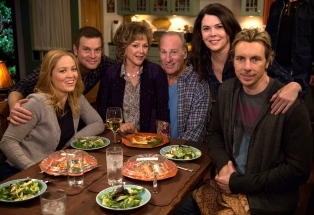 Question: I thought the final episode of Parenthood was good (Victor’s half-sister subplot aside). But the whole season left me with a feeling of lost opportunities. In the current climate, many great shows (Covert Affairs most recently) get the axe without any warning, leaving storylines, issues, and even cliffhangers unresolved. Parenthood was given a gift: fair warning that this shorter season was it. And they squandered it. Too much time wasted on side characters we didn’t care about (Hank’s ex and daughter) and too many filler episodes that felt like treading water. With so few episodes left, the writing and plots should’ve been tighter. [Spoiler alert for those who haven’t caugh up!] And as much as I like Craig T. Nelson, they should’ve killed Zeek off midway through the season so we could’ve seen a show that has always been so good at handling problems real people face (cancer, disabilities, alcoholism, etc.) deal with the impact of the death of a family patriarch. Instead it dragged his health problems out for too long. I can’t help but compare this show’s last season with the final season of another show I loved, White Collar, which also knew it was ending. The very short six-episode wrap-up was handled perfectly, focusing on who and what mattered with an ending that was satisfying and in keeping with the characters and tone of the show. — Robin
Question: I thought the final episode of Parenthood was good (Victor’s half-sister subplot aside). But the whole season left me with a feeling of lost opportunities. In the current climate, many great shows (Covert Affairs most recently) get the axe without any warning, leaving storylines, issues, and even cliffhangers unresolved. Parenthood was given a gift: fair warning that this shorter season was it. And they squandered it. Too much time wasted on side characters we didn’t care about (Hank’s ex and daughter) and too many filler episodes that felt like treading water. With so few episodes left, the writing and plots should’ve been tighter. [Spoiler alert for those who haven’t caugh up!] And as much as I like Craig T. Nelson, they should’ve killed Zeek off midway through the season so we could’ve seen a show that has always been so good at handling problems real people face (cancer, disabilities, alcoholism, etc.) deal with the impact of the death of a family patriarch. Instead it dragged his health problems out for too long. I can’t help but compare this show’s last season with the final season of another show I loved, White Collar, which also knew it was ending. The very short six-episode wrap-up was handled perfectly, focusing on who and what mattered with an ending that was satisfying and in keeping with the characters and tone of the show. — Robin
Matt Roush: To be fair, wrapping up an escapist caper series with a fairly compact core cast isn’t quite as daunting a challenge as giving emotional closure to a sprawling ensemble like the Bravermans. But even so, Parenthood obviously erred in its final season, especially at the midpoint, with those episodes that tried and failed to make us care about Hank’s annoying daughter Ruby and whether she’d ever accept Sarah. When Ruby hosted a rave in her house, I felt I was trapped in the worst kind of Afterschool Special. That storyline in particular revealed one of Parenthood‘s weaknesses (in a show I generally admired): a tendency to telegraph its twists, making it a slog at times to get through a laborious storyline whose beats you could always see coming (I’m reminded of that endless season of Julia and the surrogate).
I would disagree, though, about saving Zeek’s death to the end of the series. A family dealing with a lingering illness, and the prospect that their beloved patriarch could go at any time (heightening the urgency of Sarah’s wedding), gave the show many poignant beats to play toward the end and also provided the season with an overarching theme, giving Craig T. Nelson and the exquisite Bonnie Bedelia many affecting and memorable moments. (As I noted in my farewell column, the scene in which Camille and Zeek visited their old home was incredibly moving.) I also liked that the show’s finale was less about dying and the aftermath of grief than about a family’s resilience to keep moving forward, together. So yes, it was an imperfect final season, as most are. But on balance, it was a satisfying end to a show I wish more networks would try to emulate.
Question: I am a longtime fan with a question. You are currently touting Foyle’s War‘s final season as a top pick. Why is no longer being shown on PBS? We do not get Acorn TV. Do we have any other options of watching this great show? I think there will be a lot of mad fans! Your comments? — Anne
Matt Roush: You’re probably right, but welcome to the new landscape of what now constitutes TV. Those who’ve been following the excellent Foyle’s War for all these years on Masterpiece Mystery! may be startled to learn that the only way they can currently watch the final three movies (premiering on Mondays through February 16) is by streaming via Acorn, which is essentially Netflix for British-TV junkies. (At a considerably lower monthly fee, but still, not “free” like on PBS.) Much like what happened when Acorn acquired exclusive rights to David Suchet’s final Hercule Poirot films (including Curtain), this sort of deal is intended to put Acorn on the radar of consumers like you. If you’re not inclined to subscribe or otherwise join the wave of people streaming their favorite shows, be patient. Acorn will release the final chapters on DVD in April. (Whether they will eventually be syndicated to local public TV stations later remains to be seen, but for now, they’re exclusive to Acorn for a reason.)
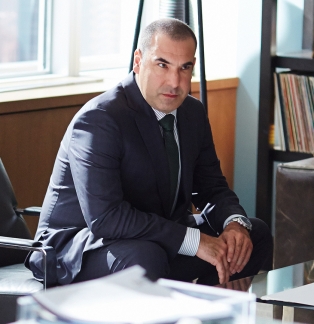 Question: I just don’t see how Suits can last another season. This “Mike is a fraud” storyline is becoming ridiculous. I don’t see how the writers can make Louis the bad guy and all the liars around him good guys. How in the heck can Mike, Rachel, Jessica and Harvey think they have the moral high ground when it comes to Louis? It’s just ridiculous. The writers are asking too much if they want me to fall for this. As a result, I don’t think this show survives much longer. What do you think? I guess you’ve figured out that Louis is my favorite character. And the writers are trying too hard to make him a dirtbag. I don’t appreciate it. And I want Katrina back! — Angela B., Alabama
Question: I just don’t see how Suits can last another season. This “Mike is a fraud” storyline is becoming ridiculous. I don’t see how the writers can make Louis the bad guy and all the liars around him good guys. How in the heck can Mike, Rachel, Jessica and Harvey think they have the moral high ground when it comes to Louis? It’s just ridiculous. The writers are asking too much if they want me to fall for this. As a result, I don’t think this show survives much longer. What do you think? I guess you’ve figured out that Louis is my favorite character. And the writers are trying too hard to make him a dirtbag. I don’t appreciate it. And I want Katrina back! — Angela B., Alabama
Matt Roush: Taking your last comment first, you’re probably in for a long wait where Katrina is concerned, because Amanda Schull is currently the female lead in Syfy’s enjoyable new version of 12 Monkeys. But to your bigger point, it seems to me the entire “fraud” premise of Suits has presented a precarious how-long-can-they-sustain-this tightrope from the start. Either you buy it, and still find a way to empathize with the main characters, or you don’t. What I find encouraging about the recent developments involving Louis on Suits is that this supposed villain has earned the sympathy of many of the show’s fans, in large measure thanks to what Rick Hoffman has done with the role, turning what initially seemed like a ghoulish ogre into a human being desperate for approval yet unable to win gracefully when he had the upper hand, thus once again becoming his worst enemy. Any scorn we now have for Louis when he stumbles is tempered with pity and empathy, regardless of the contempt in which his co-workers still hold him (and we’re meant, I think, to see them as petty for the way they still treat him so awfully, even though he often asks for it). I though last week’s midseason premiere was terrific, and the fact you’re so upset about Louis’s current situation makes me think the writers are doing their job in keeping the conflict at high boil.
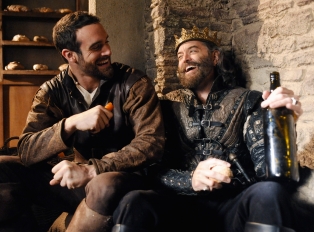 Question: I know you’re a big fan of Broadway and of course, TV, so I have to ask: What did you think of Galavant now that the run has concluded? To me, it was an interesting experiment. I liked the way it was rolled out, just like an event series that so rarely happens nowadays. I liked the cast. And the music, while of varying quality, did have me in stitches a few times. The opening “Galavant” number as well as “We’re Off on a Secret Mission” were two highlights. But overall, I found the whole thing to be a big bag of meh. I wanted more funny and just didn’t get it. It was over-the-top too often, and only Timothy Omundson as King Richard was consistently entertaining (although he too chewed the scenery a bit too vigorously for my taste). In any case, I love a good Broadway comedy, even a screwball one like Galavant, but I just wish they brought the funny more. If they have a second season, I’ll probably watch (given how good the chemistry is between Omundson and Joshua Sasse, which was sadly not explored until the end), but my expectations are severely muted. What did you think? — Andrew
Question: I know you’re a big fan of Broadway and of course, TV, so I have to ask: What did you think of Galavant now that the run has concluded? To me, it was an interesting experiment. I liked the way it was rolled out, just like an event series that so rarely happens nowadays. I liked the cast. And the music, while of varying quality, did have me in stitches a few times. The opening “Galavant” number as well as “We’re Off on a Secret Mission” were two highlights. But overall, I found the whole thing to be a big bag of meh. I wanted more funny and just didn’t get it. It was over-the-top too often, and only Timothy Omundson as King Richard was consistently entertaining (although he too chewed the scenery a bit too vigorously for my taste). In any case, I love a good Broadway comedy, even a screwball one like Galavant, but I just wish they brought the funny more. If they have a second season, I’ll probably watch (given how good the chemistry is between Omundson and Joshua Sasse, which was sadly not explored until the end), but my expectations are severely muted. What did you think? — Andrew
Matt Roush: We’re pretty much on the same page on this one. I was happy that ABC gave this project a go, and was even more thankful once I started watching that it was of such limited duration. (To be honest, because of the winter glut, I haven’t made it to the very end yet, an indication I wasn’t exactly blown away.) I love few things more than a good musical comedy, but this too often strained for effect. Still, better that than another dreary crime drama (hello, upcoming generic Secrets and Lies).
Question: Why are the networks completely incapable of airing a short-run series that actually has an ending? The latest one was Galavant, which my wife and I really enjoyed. Unfortunately, it didn’t have an ending. It wasn’t a cliffhanger, but it certainly didn’t have any kind of closure. I guess I should expect it after it’s happened so many other times (Under the Dome and others), but I just don’t understand it. If a show is good, viewers will return, and if a show is bad, they won’t. I know that every regular-length series has to end on a cliffhanger these days, but you expect a short-run series to have an ending. To put a show on for four weeks and not have an ending is just insulting to viewers. — Dennis
Matt Roush: As noted earlier, I didn’t make it quite to the end yet, but I would tend to agree that with a “limited event” series such as Galavant, especially one with such an episodic storybook premise, it’s counterproductive not to give viewers some sort of payoff for watching, especially as it was hardly a guarantee going in that viewers would embrace something this offbeat.
Question: Is there any chance Blue Bloods would bring Margaret Colin back as a possible wife for Frank? She and Tom Selleck are terrific together. — Delfiteblu (via Twitter)
Matt Roush: Doesn’t sound like it, according to an outtake from my colleague Ileane Rudolph’s recent interview with Selleck. While he spoke highly of Colin, he conceded: “I don’t think that Frank should be in a relationship. I’d like to see him flirt a little more. Frank still is obviously wearing his wedding ring. He’s kind of terrified of commitment, but he has the wit and drive to be a pretty good flirter if there’s no consequences. The consequences would freak him out.”
Question: I love watching the Golden Globes honoring someone in film with the Cecil B. DeMille Award, but how come the Hollywood Foreign Press Association doesn’t honor anyone in TV with a special award? TV actors deserve to be honored, too. — Jonathan T.
Matt Roush: At least this year’s honoree, George Clooney, harked from both the world of TV and movies—and one of his co-presenters, Julianna Margulies, was there to represent the breakout role that made him a true star: Doug Ross on ER. But otherwise, the TV contingent in the room at the Beverly Hilton is there pretty much as a courtesy, because the emphasis is clearly on the movie stars and the film industry—even in years when TV in general has had a much wider impact on the culture at large.
That’s all for now. Please send your questions and comments to [email protected].

